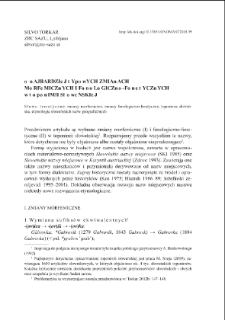- Wyszukaj w całym Repozytorium
- Piśmiennictwo i mapy
- Archeologia
- Baza Młynów
- Nauki przyrodnicze
Wyszukiwanie zaawansowane
Wyszukiwanie zaawansowane
Wyszukiwanie zaawansowane
Wyszukiwanie zaawansowane
Wyszukiwanie zaawansowane

Obiekt
Tytuł: O najbardziej typowych zmianach morfemicznych i fonologiczno-fonetycznych w toponimii słoweńskiej
Wydawca:
Instytut Języka Polskiego Polskiej Akademii Nauk
Miejsce wydania:
Opis:
Typ obiektu:
Abstrakt:
In proper name etymology the word-formation analysis, i.e. identifying the model used to form thename, is of particular importance, alongside the phonological and semantic aspects. The paper showsthat the competition between equivalent affixes played an important role in the formation of Sloveniantoponyms.Due to numerous innovations in the phonological/phonetic development of the Slovenian language,historical records importantly contribute to the etymological analysis of toponyms, as do extant vernacularforms of the name together with their adjectival and demonymic derivations.As expected, finding the counterparts in other Slavic languages — or confirming their non‑existence— often proved very useful when analysing Slovenian toponyms.Likewise, the present study once more shows that linguistic development is characterized by bothlinguistic systematicity and therefore linguistic predictability, and also linguistic non‑systematicity andtherefore linguistic unpredictability (Furlan 2016: 145).
Strona pocz.:
Strona końc.:
Szczegółowy typ zasobu:
Format:
Identyfikator zasobu:
10.17651/ONOMAST2018.39 ; oai:rcin.org.pl:105811
Język:
Prawa:
Prawa zastrzeżone - dostęp nieograniczony
Dostęp:
Kolekcje, do których przypisany jest obiekt:
- Repozytorium Cyfrowe Instytutów Naukowych > Kolekcje Partnerów > Instytut Języka Polskiego PAN > Dziedziny nauki
- Repozytorium Cyfrowe Instytutów Naukowych > Kolekcje Partnerów > Instytut Języka Polskiego PAN > Dziedziny nauki > Nauki humanistyczne
- Repozytorium Cyfrowe Instytutów Naukowych > Kolekcje Partnerów > Instytut Języka Polskiego PAN > Dziedziny nauki > Nauki humanistyczne > Językoznawstwo
- Repozytorium Cyfrowe Instytutów Naukowych > Kolekcje Partnerów > Instytut Języka Polskiego PAN > Dziedziny nauki > Nauki humanistyczne > Językoznawstwo > Onomastyka
- Repozytorium Cyfrowe Instytutów Naukowych > Kolekcje Partnerów > Instytut Języka Polskiego PAN > Książki
- Repozytorium Cyfrowe Instytutów Naukowych > Piśmiennictwo > Książki/Rozdziały
Data ostatniej modyfikacji:
2 paź 2020
Data dodania obiektu:
20 sty 2020
Liczba pobrań / odtworzeń:
392
Wszystkie dostępne wersje tego obiektu:
https://rcin.org.pl./publication/133966
Wyświetl opis w formacie RDF:
Wyświetl opis w formacie RDFa:
Wyświetl opis w formacie OAI-PMH:
| Nazwa wydania | Data |
|---|---|
| O najbardziej typowych zmianach morfemicznych i fonologiczno-fonetycznych w toponimii słoweńskiej / Torkar, Silvo | 2 paź 2020 |

 INSTYTUT ARCHEOLOGII I ETNOLOGII POLSKIEJ AKADEMII NAUK
INSTYTUT ARCHEOLOGII I ETNOLOGII POLSKIEJ AKADEMII NAUK
 INSTYTUT BADAŃ LITERACKICH POLSKIEJ AKADEMII NAUK
INSTYTUT BADAŃ LITERACKICH POLSKIEJ AKADEMII NAUK
 INSTYTUT BADAWCZY LEŚNICTWA
INSTYTUT BADAWCZY LEŚNICTWA
 INSTYTUT BIOLOGII DOŚWIADCZALNEJ IM. MARCELEGO NENCKIEGO POLSKIEJ AKADEMII NAUK
INSTYTUT BIOLOGII DOŚWIADCZALNEJ IM. MARCELEGO NENCKIEGO POLSKIEJ AKADEMII NAUK
 INSTYTUT BIOLOGII SSAKÓW POLSKIEJ AKADEMII NAUK
INSTYTUT BIOLOGII SSAKÓW POLSKIEJ AKADEMII NAUK
 INSTYTUT CHEMII FIZYCZNEJ PAN
INSTYTUT CHEMII FIZYCZNEJ PAN
 INSTYTUT CHEMII ORGANICZNEJ PAN
INSTYTUT CHEMII ORGANICZNEJ PAN
 INSTYTUT FILOZOFII I SOCJOLOGII PAN
INSTYTUT FILOZOFII I SOCJOLOGII PAN
 INSTYTUT GEOGRAFII I PRZESTRZENNEGO ZAGOSPODAROWANIA PAN
INSTYTUT GEOGRAFII I PRZESTRZENNEGO ZAGOSPODAROWANIA PAN
 INSTYTUT HISTORII im. TADEUSZA MANTEUFFLA POLSKIEJ AKADEMII NAUK
INSTYTUT HISTORII im. TADEUSZA MANTEUFFLA POLSKIEJ AKADEMII NAUK
 INSTYTUT JĘZYKA POLSKIEGO POLSKIEJ AKADEMII NAUK
INSTYTUT JĘZYKA POLSKIEGO POLSKIEJ AKADEMII NAUK
 INSTYTUT MATEMATYCZNY PAN
INSTYTUT MATEMATYCZNY PAN
 INSTYTUT MEDYCYNY DOŚWIADCZALNEJ I KLINICZNEJ IM.MIROSŁAWA MOSSAKOWSKIEGO POLSKIEJ AKADEMII NAUK
INSTYTUT MEDYCYNY DOŚWIADCZALNEJ I KLINICZNEJ IM.MIROSŁAWA MOSSAKOWSKIEGO POLSKIEJ AKADEMII NAUK
 INSTYTUT PODSTAWOWYCH PROBLEMÓW TECHNIKI PAN
INSTYTUT PODSTAWOWYCH PROBLEMÓW TECHNIKI PAN
 INSTYTUT SLAWISTYKI PAN
INSTYTUT SLAWISTYKI PAN
 SIEĆ BADAWCZA ŁUKASIEWICZ - INSTYTUT TECHNOLOGII MATERIAŁÓW ELEKTRONICZNYCH
SIEĆ BADAWCZA ŁUKASIEWICZ - INSTYTUT TECHNOLOGII MATERIAŁÓW ELEKTRONICZNYCH
 MUZEUM I INSTYTUT ZOOLOGII POLSKIEJ AKADEMII NAUK
MUZEUM I INSTYTUT ZOOLOGII POLSKIEJ AKADEMII NAUK
 INSTYTUT BADAŃ SYSTEMOWYCH PAN
INSTYTUT BADAŃ SYSTEMOWYCH PAN
 INSTYTUT BOTANIKI IM. WŁADYSŁAWA SZAFERA POLSKIEJ AKADEMII NAUK
INSTYTUT BOTANIKI IM. WŁADYSŁAWA SZAFERA POLSKIEJ AKADEMII NAUK


































